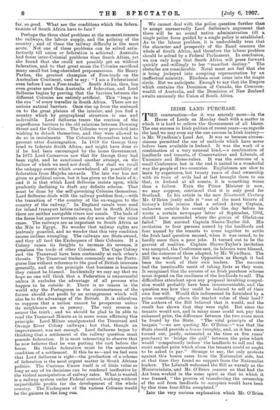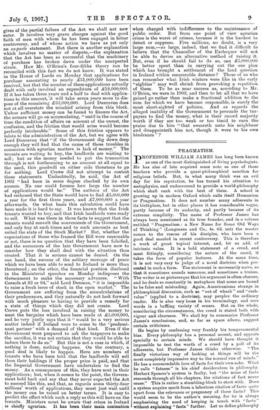IRISH LAND PURCHASE. T HE conversation—for it was scarcely more—in the
House of Lords on Monday dealt with a matter in which it is hard to relieve the Government of all blame. The one success in Irish politics of recent years—as regards the land we may even say the one success in Irish history— is Mr. Wyndham's Land Act. It was so because circum- stances permitted the use of methods which have never before been available in Ireland. It was the work of a combination of a very unusual kind,—a combination of landlords and tenants, of Conservatives and Liberals, of Unionists and Home-rulers. It was the outcome of a small Conference, but in the end it united in a wonderful way the people of two countries. Englishmen are slow to learn by experience, but twenty years of dual ownership. with its train of evils had at last brought them to see that, in Ireland at. all events, it is something worse than a failure. Even the Prime Minister is now, we may suppose, convinced that it is only good for Scotland. In his article in the new Nineteenth Century Mr. O'Brien justly calls it "one of the most bizarre of history's little ironies that a retired Army Captain, unknown outside his county club the day before he wrote a certain newspaper letter of September, 1902, should have succeeded where the genius of Gladstone failed." But succeed Captain Shawe-Taylor did. His invitation to four persons named by the landlords and four named by the tenants to come together to settle the Irish land question seemed, when it was issued, to be hardly more than a poor joke. It turned out to be the gravest of realities. Captain Shawe-Taylor's invitation was accepted, the Conference met, its labours were blessed, and the outcome of them adopted, by Mr. Wyndham. The Bill was welcomed by the Opposition as though it had been the work of their own leaders. The measure had the inestimable merit of taking facts as they were. It recognised that the success of an Irish purchase scheme must depend on the readiness of the landlords to sell. The difficulties attendant upon any proposal involving compul- sion would probably have been insurmountable, and the question was how they could be induced to sell of their own free will. Would this inducement be furnished by a price something above the market value of their laud? The authors of the Bill believed that it would, and the result has shown that they were right. But since the tenants would not, and in many cases could not, pay this enhanced price, the difference between the two sums must be found by the State. "The vital principle of the bargain "—we are quoting Mr. O'Brien—" was that the State should provide a bonus (roughly, and, as it has since turned out, justly, estimated at the time as five years' purchase) to bridge the gulf' between the price which would compulsorily induce' the landlords to sell and the strict market price which alone the tenants could or ought to be asked to pay." Strange to say, the only protests against this bonus. came from the Nationalist side, but at that time they found no support from the Nationalist leaders. The Liberal 4 welcomed the Bill as-warmly as the Ministerialists, and Mr. O'Brien assures us that had the Act been worked in the same spirit as that in which it was framed, "the process of transferring the ownership of the soil from landlords to occupiers would have been by this time four-fifths completed."
Into the very curious explanation which Mr. O'Brien gives of the partial failure of the Act we shall not now enter. It involves very grave charges against the good faith of men with whom he has been engaged in bitter controversy, and of whose action we have as yet only an ex-pane statement. But there is another explanation which involves no matter of dispute,—the explanation that the Act has been so successful that the machinery of purchase has broken down under the unexpected strain. How Mr. O'Brien's four-fifths theory can be reconciled with this fact we do not know. It was stated in the House of Lords on Monday that applications for purchase amounting to nearly £51,000,000 have been received, but that the number of these applications actually dealt with only involved an expenditure of £18,000,000. If it has taken three years and a half to deal with applica- tions to this amount, it will take seven years more to dis- pose of the remaining £33,000,000. Lord Dunraven does not at all overstate the mischief arising from this block. Unless sufficient money can be found to finance the Act, the arrears will go on accumulating, "until in the course of time the condition of affairs on account of the unrest, the confusion, and the friction that would arise would become perfectly intolerable." Some of this friction appears to relate to the administration of the Act, but we agree with Lord Dunraven that "if the Government dig down deep enough they will find that the cause of these troubles in connexion with agrarian matters is lack of money." The tenants are waiting to buy, the landlords are waiting to sell ; but as the money needed to put the transaction through is not forthcoming to an amount at all equal to the need, this goodwill on either side threatens to go for nothing. Lord Crewe did not attempt to contest these statements. Undoubtedly, he said, the Act of 1903 "had been in some degree checked by its own success. No one could foresee how large the number of applications would be." The authors of the Act bad reckoned that the State would have to find £5,000,000 a year for the first three years, and £7,000,000 a year afterwards. On what basis this calculation could have been made it is hard to say. It was known that the Irish tenants wanted to buy, and that Irish landlords were ready to sell. What was there in these facts to suggest that the tenants would consult the convenienc:e of the Government, and only buy at such times and to such amounts as best suited the state of the Stock Market ? But, whether the expectations of those who framed the Bill were reasonable or not, there is no question that they have been falsified, and the successors of the late Government have now to consider how they shall deal with the situation thus created. That it is serious cannot be denied. On the one hand, the success of the solitary message of peace which we have been able to send to Ireland is more than threatened ; on the other, the financial position disclosed in the Ministerial speeches on Monday indisposes the Government to make the necessary advances. "With Consols at 83 or 84," said Lord Denman, "it is impossible to raise a fresh issue of stock in the open market.' The Government are suffering from the miscalculations of their predecessors, and they naturally do not look forward with much pleasure to having to provide a remedy for a state of things which they did not create. Lord Crewe puts the loss involved in raising the money to meet the bargains which have been made at £5,000,000, and be very Justly says that it "would be a very serious matter indeed if Ireland were to come to the predomi- nant partner' with a demand of that kind. Even if the Government were prepared to ask the taxpayers to make the sacrifice, it was not certain that they would be able to induce them to do so." But this is not a. case in which, if nothing is done, nothing happens. On the contrary, a good deal is likely to happen. Here are numbers of tenants who have been told that the landlords will sell them their holdings if the proper price is paid, and that the Imperial Government have undertaken to find the money. As a consequence of this, they have sent in their applications; but, when it comes to the point, the Govern- ment hold back and say that they never expected the Act to succeed like this, and that, as regards some thirty-four millions' worth of applications, they must just wait until the money can be raised on better terms. It is easy to predict the effect which such a reply as this will have on the tenants. Ministers must be aware that crime in Ireland is chiefly agrarian. It has been their main contention when charged with indifference to the maintenance of public order. But from one point of view agrarian crime is the worst of crimes, because it is the hardest to detect or suppress. Five millions, no doubt, is a very large sum,—so large, indeed, that we find it difficult to believe that the Chancellor of the Exchequer will not be able to devise an alternative method of raising it. But, even if he should fail to do so, can £5,000,000 be better spent than in carrying out the one plan which has brought a settlement of the land question in Ireland within measurable distance ? Those of us who can remember what Irish winters were like in the early "eighties" may well shrink from provoking a repetition of them. To be as near success as, according to Mr. O'Brien, we were in 1903, and then to let all that we have gained go rather than make a fractional addition to the sum for which we have become responsible, is surely the most short-sighted of policies. And as regards the alleged inability of the Government to persuade the tax- payers to find the money, what is their record majority worth if they are too weak or too timid to earn the praise due to him "that sweareth unto his neighbour and disappointeth him not, though it were to his own hindrance " ?















































 Previous page
Previous page